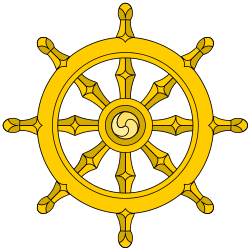Cunda (Buddhism)
| Kunda | |
|---|---|
 Cunda preparing pork, Wat Kasatrathiraj, Ayutthaya | |
| Religion | Buddhism |
| Religious career | |
| Teacher | Buddha |
| Profession | Blacksmith, Upasaka |
| Part of a series on |
| Buddhism |
|---|
 |
|
In Buddhism in the Mahaparinibbana Sutta of the Pali canon, Kunda or Cunda (Chinese: 準陀; pinyin: Zhǔntuó) was a blacksmith who gave the last meal as an offering to Buddha. Falling violently ill, The Buddha instructed his attendant Ānanda to convince Cunda that the meal eaten at his place had nothing to do with his passing and that his meal would be a source of the greatest merit as it provided the last meal for a Buddha.[1] Buddha recovered from his illness before he attained parinirvana.
The precise contents of the Buddha's final meal are not clear, due to variant scriptural traditions and ambiguity over the translation of certain significant terms; the Mahayana tradition generally believes that the Buddha was offered some sort of truffle or other mushroom, while the Theravada tradition believes that the Buddha consumed some kind of pork.[2][note 1] These may reflect the different traditional views on Buddhist vegetarianism and the precepts for monks and nuns.
Notes
- ↑ The controversial term used is Sukara-maddava. Sukara = pig; maddava = soft, tender, delicate. Hence two alternative renderings of the compound are possible: (1) the tender parts of a pig or boar; (2) what is enjoyed by pigs and boars. In the latter meaning, the term has been thought to refer to a mushroom or truffle, or a yam or tuber. K.E. Neumann, in the preface to his German translation of the Majjhima Nikaya, quotes from an Indian compendium of medicinal plants, the Rajanigantu, several plants beginning with sukara.
References
- ↑ Maha-parinibbana Sutta (DN 16), verse 56
- ↑ Buswell, Robert E. Jr and Donald S. Lopez Jr. The Princeton Dictionary of Buddhism. Princeton University Press, 2014. pg. 529